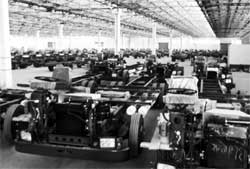CNG bus market
 The Tata Engineering and Locomotive Company (telco), one of the two leading diesel bus manufacturers in India, is clearly not very happy with the cng solution. The company has been still looking for a chance to negotiate for diesel. Since April 1999, when the Supreme Court began to address the diesel versus cng issue for Delhi buses, telco used every opportunity to project diesel as a more viable option. On April 29, 1999, the court heard the Bhure Lal committee’s suggestion of restricting the registration of diesel cars in Delhi. Fali Nariman, counsel for telco and a member of the Rajya Sabha, argued that if diesel pollutes, so does petrol, and that both should be restricted. He insinuated that the committee’s recommendation smacked of a bias against diesel.
The Tata Engineering and Locomotive Company (telco), one of the two leading diesel bus manufacturers in India, is clearly not very happy with the cng solution. The company has been still looking for a chance to negotiate for diesel. Since April 1999, when the Supreme Court began to address the diesel versus cng issue for Delhi buses, telco used every opportunity to project diesel as a more viable option. On April 29, 1999, the court heard the Bhure Lal committee’s suggestion of restricting the registration of diesel cars in Delhi. Fali Nariman, counsel for telco and a member of the Rajya Sabha, argued that if diesel pollutes, so does petrol, and that both should be restricted. He insinuated that the committee’s recommendation smacked of a bias against diesel.
telco didn’t give up even after the court refused to dilute its stand on cng . On January 31, 2001, the court clarified that Euro ii diesel taxis could ply in the Capital. The telco counsel was quick to take up on that and argue for Euro ii diesel buses. The plea wasn’t entertained. When the matter began to look serious in March 2001, Nariman waived yet another study to contend that diesel emissions could be better than those from cng . These frantic efforts point clearly to a campaign of the diesel industry to promote diesel, even if this is at the cost of public health.
One might wonder: why is telco so opposed to cng ? One possible explanation to this is that the company is desperately trying to protect its shrinking share in the bus market
Related Content
- First food: business of taste
- Reply by the Central Pollution Control Board (CPCB) on cutting of trees for the construction of a cold storage project, Vikasnagar, Uttarakhand, 09/05/2025
- Disruption and Disarray: An analysis of pangolin scale and ivory trafficking, 2015-2024
- South African Renewable Energy Masterplan (SAREM)
- Asian Development Outlook- April 2025
- Global Electricity Review 2025
